Cannabis Facts, Tips & Resources
Consuming cannabis is a personal choice and if it is one that you are making we want to provide you with guidelines related to the Lower Risk Use of Cannabis, some potential health effects to be aware of and tips for chatting with your kids about cannabis. Within the resources offered here you will also find links to other great sources of information.
For more information & resources related to cannabis visit the Addictions Foundation of Manitoba website at www.WeedingOutTheFacts.ca

Cannabis & Your Health
Know the Health Effects

- After alcohol, cannabis is the most widely used psychoactive substance in Canada. Users of this product should be familiar with the potential health effects that can occur from usage.
- Combining cannabis with alcohol is likely to result in a greater impairment than when these products are consumed individually. This combination can increase your chances of having a negative experience.
- It is also important to be aware of the effects that cannabis can have on your prescription drugs. Always ask your doctor and your pharmacist how cannabis might interact with your prescribed medication prior to using both products.
Mental Health
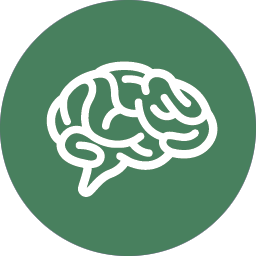
- Chronic use is related to mild cognitive impairments and increased risk of psychosis.
- Individuals that use cannabis – especially those who start using it in their early teens and use it frequently – are at increased risk for psychosis and psychotic symptoms. Some research suggests that the risk is increased for individuals who use cannabis products that are high in THC.
- Those already prone to psychosis (i.e. they may have a family member who suffers from psychosis) are especially at increased risk for developing psychosis with cannabis use.
- Chronic cannabis use has been linked to depression, anxiety and suicidal behaviours, but at this point there is not enough evidence to show that cannabis use can cause these mental health outcomes.
Cannabis and Respiratory Effects
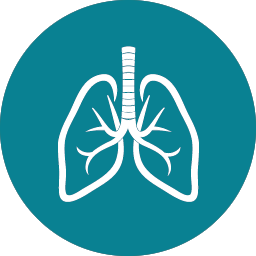
- Frequent cannabis smoking has been consistently related to a greater incidence of coughing and breathing problems.
- Research suggests smoking cannabis may be even more harmful to a person’s airways and lungs than smoking tobacco, since cannabis smoking often involves unfiltered smoke, larger puffs, deeper inhalation and longer breath holding.
Cannabis Use During Pregnancy
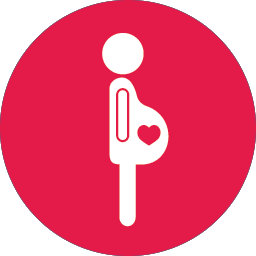
- Heavy use during pregnancy negatively affects children’s cognitive functioning and mental health and may increase the likelihood of future substance use.
Cannabis and Driving
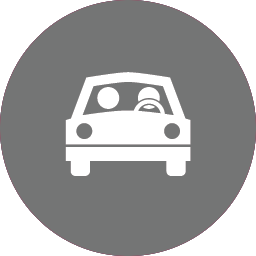
- Cannabis can negatively affect driving performance and doubles the risk of collision. Never drive impaired.
Stay informed: visit www.ccsa.ca and https://makeconnections.ca/links/cannabis-information-resources/ for more information.
Download The Cannabis and Your Health PDF
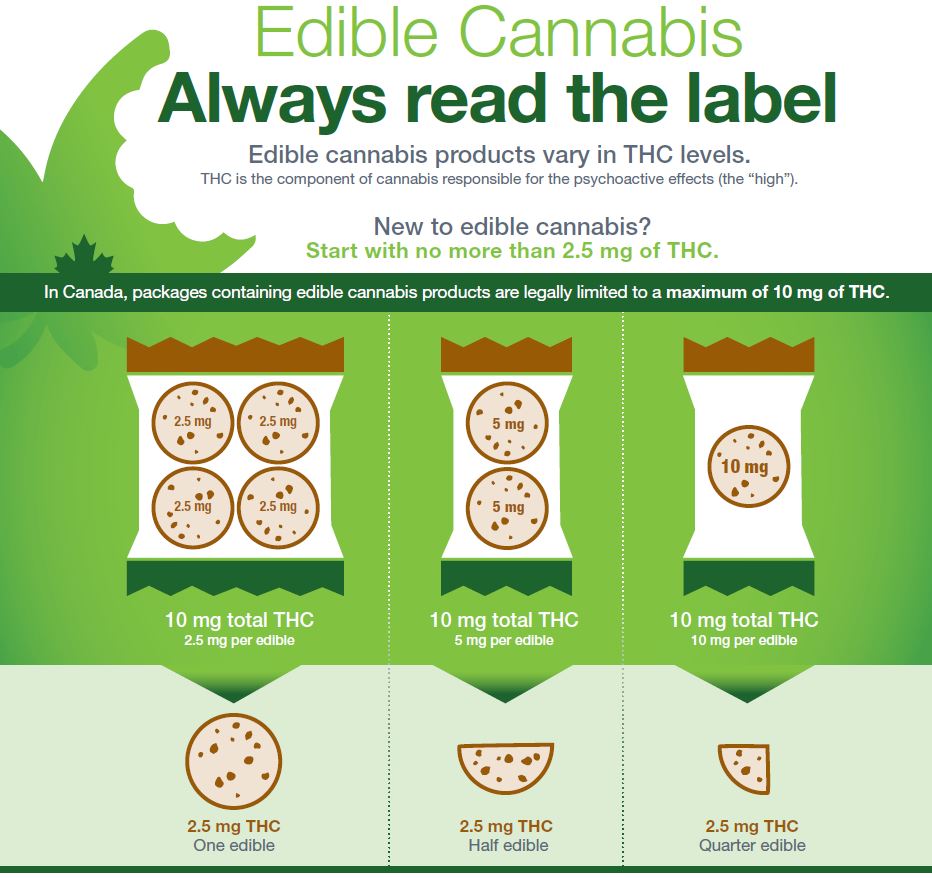
Edible cannabis products vary in THC levels.
THC is the component of cannabis responsible for the psychoactive effects (the “high”).
New to edible cannabis?
Start with no more than 2.5 mg of THC.
In Canada, packages containing edible cannabis products are legally limited to a maximum of 10 mg of THC.
Start Low, Go Slow
The effects of edible cannabis can take up to 4 hours to appear and can last up to 12 hours, with some effects lasting up to 24 hours.
Learn about the health effects of cannabis and how to lower your health risks at: ccsa.ca/cannabis and canada.ca/cannabis

Cannabis & Your Teens
Chatting with your kids about cannabis doesn’t require one long formal discussion. In fact, multiple little chats about cannabis with your teen can also have a positive impact on their decision making.
With our busy lives it can sometimes feel difficult to find the time for a chat about cannabis or alcohol. However, opportunities for a quick chat actually occur more often than we think. Look for a few free minutes when you are driving home from a sporting event or team practice, when you are at the dinner table or maybe you are watching a TV show in which cannabis is used; these are all great times to break the ice and let your teen know it is okay to talk about cannabis use.
Don’t hesitate or feel awkward about this chat; chances are good that your teenager is looking to talk too but might be afraid to ask you questions. By making this a comfortable topic to discuss, your teen might be more likely to ask you the questions that are really on their mind.
It never hurts to be prepared for these little chats. There are many great resources available to help educate parents about cannabis use and teens. We have selected just a few of these sources to help you get started.
Check out the following resources:

www.parentactionpack.ca

www.ccsa.ca/Eng/topics/Marijuana

www.ccsa.ca/Eng/topics/Marijuana

https://www.drugfreekidscanada.org/drug-info/cannabis/
Remember, peer pressure can be a powerful influence on your teen. There is a good chance that they are looking for your support to fight the peer pressure.
When you chat with your kids about cannabis, let them know that:
- Early and regular cannabis use can negatively affect their brain and behaviour.
- Delaying initiation of cannabis use can help prevent some of the harmful effects associated with cannabis use.
- Despite what your friends tell you, most teens are not using cannabis.
Youth Cannabis Facts
- Youth typically begin using cannabis around 15 – 16 years old. Chatting about cannabis prior to this can help them make informed choices.
- Your teen’s friends might make them believe that everyone uses cannabis; however, the facts
show that only about 23% of youth ages 15-24 years used cannabis in 2013. That means over 75% of youth in this age group did not use it. Your teen might be comforted to know that nonusers make up the majority of youth.
Facts vs Fiction
Stay informed: visit www.ccsa.ca and https://makeconnections.ca/links/cannabis-information-resources/ for more information.
Download the Cannabis and Your Teens PDF

Canada’s Lower Risk Cannabis Use Guidelines
Acknowledgment
The Lower-Risk Cannabis Use Guidelines (LRCUG) are an evidence-based intervention project by the Canadian Research Initiative in Substance Misuse (CRISM), funded by the Canadian Institutes of Health Research (CIHR).
Cannabis and Health
Using cannabis is a personal choice, but it can have short- and long-term effects on your health. Cannabis can affect your thinking, physical co-ordination and control, and increase your risk of accidents, injuries, reproductive issues and mental health problems, including dependence. Smoking cannabis can increase your chances of having lung problems.
Cannabis Use and Others
Remember that cannabis use can also harm those around you. Be considerate of other people’s health and preferences if you choose to use cannabis.
If You Develop Problems
Some people who use cannabis develop problems and may become dependent. Don’t hesitate to seek support if you think you need help controlling your cannabis use, if you experience withdrawal symptoms or if your use is affecting your work, school or social and family life. You can find help online, or through a doctor or other health professional.
10 Ways to Reduce Risks to Your Health When Using Cannabis
- Remember that every form of cannabis use poses risks to your health. The only way to completely avoid these risks is by choosing not to use cannabis. If you decide to use cannabis, follow these recommendations to lower risks to your health.
- The earlier in life you begin using cannabis, the higher your risk of serious health problems. Teenagers, particularly those younger than 16, should delay using cannabis for as long as possible. You’ll lower your risk of cannabis-related health problems if you choose to start using cannabis later in life.
- Higher-strength or more powerful cannabis products are worse for your health. If you use products with high tetrahydrocannabinol (THC) content, the main mind-altering ingredient in cannabis, you’re more likely to develop severe problems, such as dependence or mental health problems. Cannabidiol (CBD), another cannabis ingredient, can counteract some of THC’s psychoactive effects. If you use, choose low-strength products, such as those with a lower THC content or a higher ratio of CBD to THC.
- Don’t use synthetic cannabis products. Compared with natural cannabis products, most synthetic cannabis products are stronger and more dangerous. K2 and Spice are examples of synthetic cannabis products. Using these can lead to severe health problems, such as seizures, irregular heartbeat, hallucinations and in rare cases, death.
- Smoking cannabis (for example, smoking a joint) is the most harmful way of using cannabis because it directly affects your lungs. There are safer, non-smoking options like vaping or taking edibles that are better for your lungs. Keep in mind that these alternatives aren’t risk-free either.
- If you choose to smoke cannabis, avoid inhaling deeply or holding your breath. These practices increase the amount of toxins absorbed by your lungs and the rest of your body, and can lead to lung problems.
- The more frequently you use cannabis, the more likely you are to develop health problems, especially if you use on a daily or near-daily basis. Limiting your cannabis use to occasional use at most, such as only using once a week or on weekends, is a good way to reduce your health risks. Try to limit your use as much as possible.
- Cannabis use impairs your ability to drive a car or operate other machinery. Don’t engage in these activities after using cannabis, or while you still feel affected by cannabis in any way. These effects typically last at least six hours, but could be longer, depending on the person and the product used. Using cannabis and alcohol together further increases your impairment. Avoid this combination before driving or operating machinery.
- Some people are more likely to develop problems from cannabis use. Specifically, people with a personal or family history of psychosis or substance use problems, and pregnant women should not use cannabis at all.
- Avoid combining any of the risky behaviours described above. The more risks you take, the greater the chances of harming your health as a result of cannabis use.
Please note: These recommendations are aimed mainly at non-medical cannabis use.
10 Ways to Reduce Risks to Your Health When using Cannabis PDF
